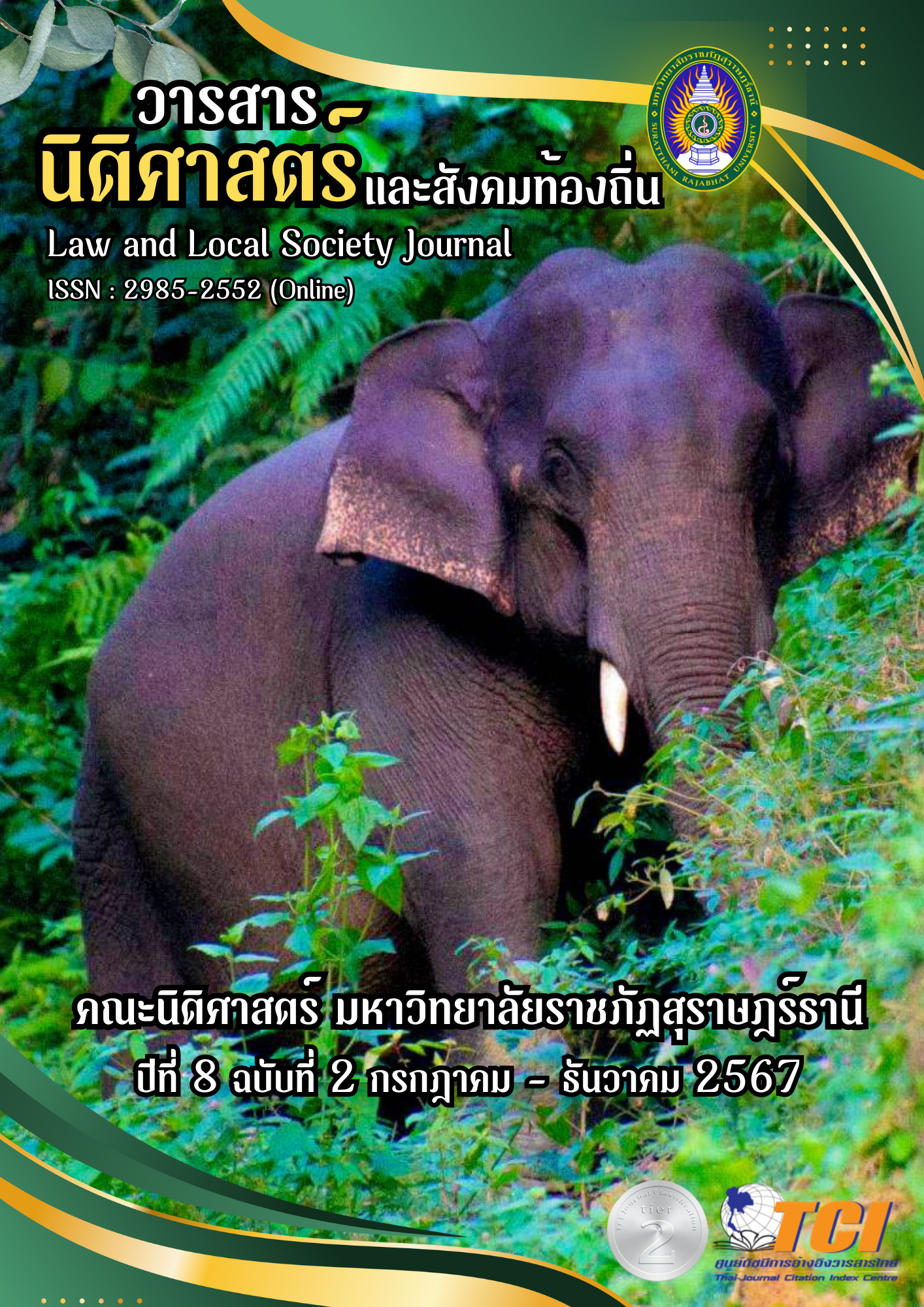แนวทางการพัฒนาทักษะการสื่อสารภาษาอังกฤษเพื่อการท่องเที่ยวเชิงอนุรักษ์ตำบลบางใบไม้ อำเภอเมือง จังหวัดสุราษฎร์ธานี : กรณีศึกษาล่องเรือชุมชน
คำสำคัญ:
ทักษะการสื่อสารภาษาอังกฤษ, การท่องเที่ยวเชิงอนุรักษ์, ล่องเรือชุมชนบทคัดย่อ
บทความวิจัยฉบับนี้มีวัตถุประสงค์เพื่อ (1) ศึกษาความต้องการและแนวทางการพัฒนาทักษะการสื่อสารภาษาอังกฤษเพื่อการท่องเที่ยวเชิงอนุรักษ์ และ (2) เสนอแนว ทางการพัฒนาทักษะการสื่อสารภาษาอังกฤษเพื่อการท่องเที่ยวเชิงอนุรักษ์ กรณีศึกษาล่องเรือชุมชน ผ่าน 3 กิจกรรม ได้แก่ ล่องเรืออุโมงค์ใบจาก ล่องเรือชมวิถีชีวิตลัดเลาะคลองร้อยสาย และล่องเรือชมหิ่งห้อย กลุ่มเป้าหมายแบ่งเป็น 2 กลุ่ม ได้แก่ (1) กลุ่มชุมชน ที่มีส่วนเกี่ยวข้องกับการท่องเที่ยวล่องเรือชุมชน 3 กิจกรรม ๆ ละ 5 คน รวมจำนวน 15 คน โดยใช้วิธีการเลือกแบบเจาะจง และ (2) นักท่องเที่ยวชาวต่างชาติที่ท่องเที่ยวล่องเรือชุมชน 3 กิจกรรม ๆ ละ 3 คน รวมจำนวน 9 คน โดยใช้วิธีการเลือกแบบบังเอิญ เครื่องมือที่ใช้ในการวิจัย ได้แก่ แบบสัมภาษณ์แบบมีโครงสร้าง ประเด็นคำถามสอบถามความต้องการ และแนวทางการพัฒนาทักษะการสื่อสารภาษาอังกฤษ เพื่อการท่องเที่ยวในชุมชน ดำเนินการวิเคราะห์ข้อมูลเชิงเนื้อหา
ผลการวิจัย พบว่า (1) ความต้องการในการพัฒนาทักษะการสื่อสารภาษาอังกฤษเพื่อการท่องเที่ยวเชิงอนุรักษ์ ประกอบด้วย 4 ประเด็นหลัก ได้แก่ บทสนทนาในชีวิต ประจำวัน สถานที่ท่องเที่ยว สิ่งอำนวยความสะดวก และสินค้า (2) แนวทางการพัฒนาทักษะการสื่อสารภาษาอังกฤษเพื่อการท่องเที่ยวเชิงอนุรักษ์ เน้นการพัฒนาทักษะการฟังและการพูด โดยมีแนวทางในการพัฒนา 4 ขั้นตอน ดังนี้ หนังสือรวมคำศัพท์ และหนังสือรวมประโยคที่ใช้ในการสื่อสาร (เอกสาร/ออนไลน์) YouTube ออกเสียงคำศัพท์ และประโยค หนังสือรวบรวมข้อมูลการใช้เทคโนโลยีช่วยแปลภาษา และการฝึกปฏิบัติกับชาวต่างชาติ
ข้อเสนอแนะจากการวิจัยในครั้งนี้ ได้แก่ การพัฒนาทักษะการสื่อสารภาษา อังกฤษ ควรได้รับความร่วมมือจากทุกหน่วยงานที่เกี่ยวข้อง เพื่อจัดตั้งงบประมาณใน การพัฒนา การดำเนินการสร้างป้ายหรือข้อมูลพื้นฐาน และดำเนินการพัฒนาทักษะ ภาษาอังกฤษอย่างต่อเนื่อง
เอกสารอ้างอิง
Chanyanit Intara, Prachanan Charoenapornwatana, & Rapin Chuchuen. (2020). Problems and Needs for Developing English Communication Skills in the Workplace: A Case Study of Commercial Bank Employees in Pattaya City. Pathumthani University Academic Journal, 12(2), 266-276.
Community Organizations Development Institute (CODI), Office of Innovation and Knowledge Management Development (Public Organization). (2023). The Way of 'Khon Klong Roi Sai' in Bang Bai Mai Subdistrict, Surat Thani Province, and the Community Market’s Adaptation During Crises. Retrieved July 10, 2024, from https://web.codi.or.th/ 20220423-33490/.
Community-Based Tourism Institute. (2017). Community-Based Tourism Institute: CBT-I. Retrieved July 20, 2024, from https://www.facebook .com/cbticlub/?locale=th_TH.
Danchanee Empanthun. (2007). The Development of Community-Based Tourism and Homestay Activities. Bangkok: Kasetsart University Press.
Department of Tourism. (2018). Community-Based Tourism Standards. Bangkok: Chulalongkorn University Press.
National Tourism Policy Committee. (2023). The 3rd National Tourism Deve lopment Plan (2023-2027). Retrieved July 10, 2024, from https:// planning.dusit.ac.th/main/wp-content/uploads/2023.
Natthaphat Maneeroj. (2017). Community-Based Tourism Management. Journal of Thai Hospitality and Tourism, 13(2), 25-46.
Pojana Suansri & Sompop Yeejorhor. (2013). Community-Based Tourism Standards Manual. Chiang Mai: Payap University.
Siriporn Butsanom. (2021). Tourism Behavior, Satisfaction, and Decision-Making for Ecotourism at Rak Samet Bridge, Rayong Province. Nakhon Pathom Rajabhat University Journal of Management Science, 8(2), 167-178.
Somsak Samakkidhamma. (2021). Community-Based Tourism, Philosophy of Sufficiency Economy, and Sustainable Development. Journal of Social Development, 23(1), 21–225.
Surat Thani Provincial Public Health Office. (2023). Bang Bai Mai Subdistrict, Mueang District, Surat Thani Province. Retrieved July 15, 2024, from https://xn-2222cehaco3gb0etasham2az7ci5bmc7hjavfrketfc.com/ bangbaimai/.
Das, M. & Chatterjee, B. (2015). Ecotourism: A panacea or a predicament? Tourism Management Perspectives, 14, 3-16.
Doan, T. M. (2010). The effects of ecotourism in developing nations: An analysis of case studies. Journal of Sustainable Tourism, 8(4), 288-304.
Kim, Hea-Suk, Cha Y.. & Kim, Na Young (2021). Effects of AI Chatbots on EFL students’ communication skills. Korean Journal of English Language and Linguistics, 21, 712-734.
Kiper, T. (2013). Role of Ecotourism in Sustainable Development. In: Advances in Landscape Architecture, IntechOpen, London, 773-802.
Kristiani P. E., & PradnyDewi, Diah Ayu M. (2021) The Effectiveness of YouTube as Learning Media in Improving Learners’ Speaking Skills. The Art of Teaching English As a Foreign Language (TATEFL), 2(1), 7-11.
Poyyamoli G. (2018). Ecotourism policy in India: rhetoric and reality. Grassroots Journal of Natural Resources, 1(1), 46–61.
Syarifudin, & Rahmat, H. (2021) Intercultural Communication of EFA Students with Foreigners as A Strategy of Teaching Speaking. Journal of English Language Education, 4(1), 65-89.
Wood, C., Fitton, L., & Rodriguez, E. (2018). Home Literacy of Dual-Language Learners in Kindergarten from Low-SES Backgrounds. AERA Open, 4(2).
ดาวน์โหลด
เผยแพร่แล้ว
รูปแบบการอ้างอิง
ฉบับ
ประเภทบทความ
สัญญาอนุญาต
ลิขสิทธิ์ (c) 2024 วารสารนิติศาสตร์และสังคมท้องถิ่น

อนุญาตภายใต้เงื่อนไข Creative Commons Attribution-NonCommercial-NoDerivatives 4.0 International License.
บทความที่ได้รับการตีพิมพ์ในวารสารนิติศาสตร์และสังคมท้องถิ่น คณะนิติศาสตร์ มหาวิทยาลัยราชภัฏสุราษฎร์ธานี ถือเป็นลิขสิทธิ์ของวารสาร ทั้งนี้ ข้อมูล เนื้อหา และข้อคิดเห็นที่ปรากฏในบทความเป็นความรับผิดชอบของผู้เขียนแต่เพียงผู้เดียว กองบรรณาธิการไม่มีความจำเป็นต้องเห็นด้วยหรือร่วมรับผิดชอบใด ๆ
เนื้อหา ข้อมูล รูปภาพ และองค์ประกอบอื่น ๆ ที่ได้รับการตีพิมพ์ในวารสารฯ อยู่ภายใต้ลิขสิทธิ์ของวารสารนิติศาสตร์และสังคมท้องถิ่น การนำไปเผยแพร่ ดัดแปลง หรือใช้ประโยชน์ในลักษณะใด ๆ ไม่ว่าเป็นบางส่วนหรือทั้งหมด ต้องได้รับอนุญาตเป็นลายลักษณ์อักษรจากวารสารก่อน


